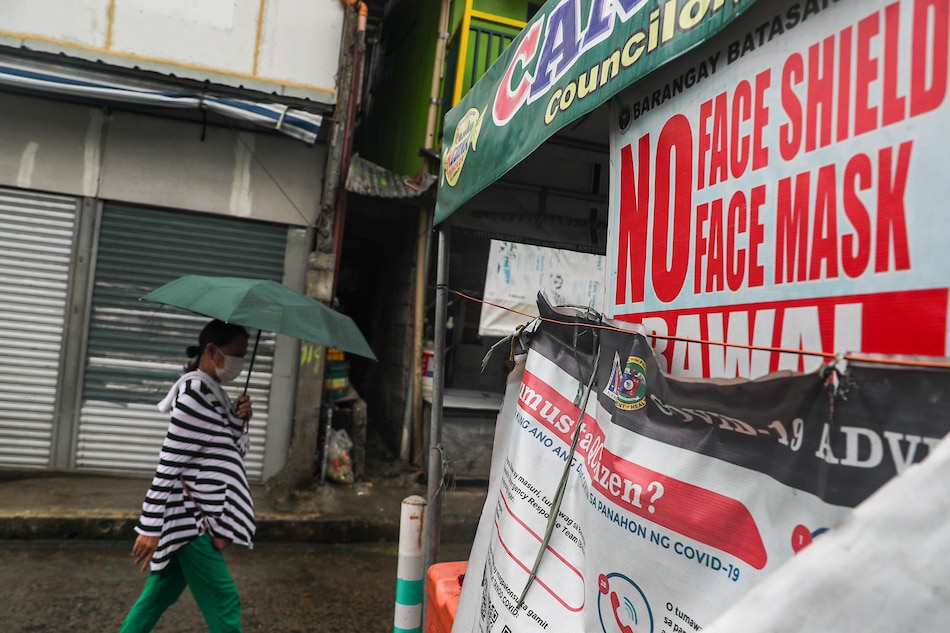CHR: Barring unvaccinated people from going out may cause 'undue discrimination'
ADVERTISEMENT

Welcome, Kapamilya! We use cookies to improve your browsing experience. Continuing to use this site means you agree to our use of cookies. Tell me more!
CHR: Barring unvaccinated people from going out may cause 'undue discrimination'
ABS-CBN News
Published Jul 30, 2021 02:13 PM PHT
|
Updated Jul 30, 2021 02:25 PM PHT
MANILA - Preventing unvaccinated people from going out while COVID-19 vaccine supply remains limited may lead to "undue discrimination," the Commission on Human Rights (CHR) said on Friday.
MANILA - Preventing unvaccinated people from going out while COVID-19 vaccine supply remains limited may lead to "undue discrimination," the Commission on Human Rights (CHR) said on Friday.
In a statement, CHR Spokesperson Jacqueline Ann de Guia pointed out that the country's vaccine supply is still limited at present, adding that the government's immunization program is hounded by vaccine hesitancy driven by circulating misinformation.
In a statement, CHR Spokesperson Jacqueline Ann de Guia pointed out that the country's vaccine supply is still limited at present, adding that the government's immunization program is hounded by vaccine hesitancy driven by circulating misinformation.
“With all these challenges, preventing unvaccinated individuals from leaving their homes may result in undue discrimination considering that there are reasons for being unvaccinated that are beyond their control,” De Guia said.
“With all these challenges, preventing unvaccinated individuals from leaving their homes may result in undue discrimination considering that there are reasons for being unvaccinated that are beyond their control,” De Guia said.
This developed after President Rodrigo Duterte this week urged village chiefs to monitor the vaccination status in their areas and bar unvaccinated people from going outside their houses.
This developed after President Rodrigo Duterte this week urged village chiefs to monitor the vaccination status in their areas and bar unvaccinated people from going outside their houses.
ADVERTISEMENT
Duterte, who admitted there is no law punishing unvaccinated individuals, also said he is prepared to face any lawsuits that would arise from his order since he is only preventing COVID-19 outbreaks.
Duterte, who admitted there is no law punishing unvaccinated individuals, also said he is prepared to face any lawsuits that would arise from his order since he is only preventing COVID-19 outbreaks.
But the commissioner said the President's order could affect Filipinos negatively.
But the commissioner said the President's order could affect Filipinos negatively.
"Such restrictions will ultimately have an impact on their abilities to cope with the effects of the pandemic, including effects on livelihood and ability to fend for themselves in the absence of explicit proposals for aid while in isolation," according to the commissioner.
"Such restrictions will ultimately have an impact on their abilities to cope with the effects of the pandemic, including effects on livelihood and ability to fend for themselves in the absence of explicit proposals for aid while in isolation," according to the commissioner.
The country has taken delivery of nearly 33.9 million vaccine doses as of Friday, just as the government administered 19.36 million COVID-19 jabs.
The country has taken delivery of nearly 33.9 million vaccine doses as of Friday, just as the government administered 19.36 million COVID-19 jabs.
Since the vaccination program started in March, only 7.8 million Filipinos have so far been fully inoculated, with over 11.5 million receiving their first shot against the disease.
Since the vaccination program started in March, only 7.8 million Filipinos have so far been fully inoculated, with over 11.5 million receiving their first shot against the disease.
ADVERTISEMENT
HUMAN RIGHTS IN TIMES OF CRISIS
Under the Siracusa Principles adopted by the United Nations Economic and Social Council in 1984, restricting human rights in times of emergency must not only be based on necessity but should also be lawful and proportionate to its goal, the CHR said.
Under the Siracusa Principles adopted by the United Nations Economic and Social Council in 1984, restricting human rights in times of emergency must not only be based on necessity but should also be lawful and proportionate to its goal, the CHR said.
“These principles also cite that policies restricting human rights—in this case, freedom of movement—must be based on scientific evidence; neither arbitrary nor discriminatory; and should especially be mindful of its possible disproportionate impacts to marginalized populations,” she said.
“These principles also cite that policies restricting human rights—in this case, freedom of movement—must be based on scientific evidence; neither arbitrary nor discriminatory; and should especially be mindful of its possible disproportionate impacts to marginalized populations,” she said.
The CHR also reminded the government that more important than preventing people to go out of their homes, various challenges must be addressed first such as ensuring the steady supply of vaccines.
The CHR also reminded the government that more important than preventing people to go out of their homes, various challenges must be addressed first such as ensuring the steady supply of vaccines.
The health department earlier confirmed local transmission of the more contagious COVID-19 Delta variant, which had ravaged India India and caused a surge in cases in Indonesia.
The health department earlier confirmed local transmission of the more contagious COVID-19 Delta variant, which had ravaged India India and caused a surge in cases in Indonesia.
With more than 1.5 million coronavirus cases and some 27,000 deaths, the Philippines has the second worst COVID-19 outbreak in Southeast Asia.
With more than 1.5 million coronavirus cases and some 27,000 deaths, the Philippines has the second worst COVID-19 outbreak in Southeast Asia.
- with reports from Adrian Ayalin, ABS-CBN News
WATCH
Read More:
COVID-19
coronavirus
Delta variant
Commission on Human Rights
CHR
COVID-19 vaccine
COVID-19 vaccination
De Guia
ADVERTISEMENT
ADVERTISEMENT



